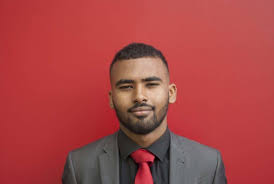Mohamed Munye Abrar would like to go back in time to tell his three-year-old self ‘this is what happens to us’
Getting in to Oxford is undoubtedly a great achievement, but for Mohamed, it’s also bittersweet – he knows he will be one of only a small number of non-white students there (Photo: Mohamed Munye Abrar)
Mohamed Munye Abrar, from Hackney, east London, was unable to speak English when he came to the UK from Kenya aged three without his parents, who are originally from Somalia. Now he’s going to study the language, along with Portuguese, at the University of Oxford. Mohamed Munye Abrar, 18, got his A-level results today, but he still remembers his first day at nursery. He’d only recently arrived in the UK from Kenya, where he was born, and where his Somali parents still live today.
He spoke no English, and his paternal uncles became his legal guardians upon his arrival. ‘I spent a lot of nursery in tears’ The east London school Mohamed was sent to had a Swahili teaching assistant who, the authorities believed, would help to facilitate his education, but there was a problem: “I barely spoke Swahili at the time. I spoke a dying rural language – Chimwiini,” Mohamed says. Lonely and unable to communicate, Mohammed spent “a lot of nursery in tears”. Gradually he began learning English, not through speaking but by picking up books. He realised he “really liked” to read. “It was the fastest way for me to get the language, the culture, words that I needed,” he recalls. The experience is fresh in his memory roday, in part because he drew on it when he sat down to write his personal statement when applying for university. Scared and relieved “It was a scary experience [getting my A Level results] and also a huge relief.”
Mohamed took English literature, Spanish and classical civilisation and was awarded an A*, an A and a B. He also did maths last year, got an A and dropped the subject. The B was in classics and he and his classmates have sent their papers off to be re-marked as many of their grades fell far below the As and A*s they were predicted. Making sacrifices Mohamed and his family have made “huge sacrifices” over the years and, though he obviously loves his uncles, growing up so far away from his parents was not easy. “I remember parents evenings – everyone else had mum and dad, I had my uncle with me.
I love my uncle to bits but growing up you’re always taught about conventional families – mum, dad – and [I] was there alone.” Mohamed last visited his parents six years ago and they don’t know about his achievement yet – he’s waiting for his family in Kenya to all get together before he shares the news. Oxford acceptance is a bittersweet achievement Getting in to Oxford is undoubtedly a great achievement, says Mohamed, who also obtained 11 A*s at GCSE. But, he says, while he feels pride, “it’s also bittersweet”. Mohamed knows he will be one of only a small number of non-white students at the university. “It’s scary,” he says. ‘Sea of white people’ During the interview stage he remembers walking in to a common room and panicking when confronted by “that sea of white people who looked like they knew each other”. He says: “It wasn’t a fun experience at all.” There are two organisations that Mohamed says helped me “massively” during the admissions process.
Members of the Oxford African and Caribbean Society tutored Mohamed and his peers ahead of their interviews and even helped them to revise for their exams. One member, Tamiya, traveled from Oxford to London to perform a mock interview with Mohamed two days before the real one took place. Holding his own The Amos Bursary, co-founded by the Labour life peer Baroness Valerie Amos, “gave me the confidence to be able to walk into a space like Oxford – white-dominated, middle-class dominated – hold my own,” Mohamed says.
It was this support that he drew on when he entered the common room and began to panic. “I remembered my confidence training and public speaking skills and mustered up every single bit of courage and got stuck in and tried to integrate,” he says. Colour and class “It isn’t just about colour for me. In my personal experience class played a bigger factor in my fear. “I met people of colour who turned out to be middle class and I actually got on with people who were white working class people who were there for interviews.” Mohamed would like to go back in time and “show my three year old self that this is what happens to us”. “It is just university but it will be four years of my life and it is a proud achievement. But for me it’s just the start.”
INews







































